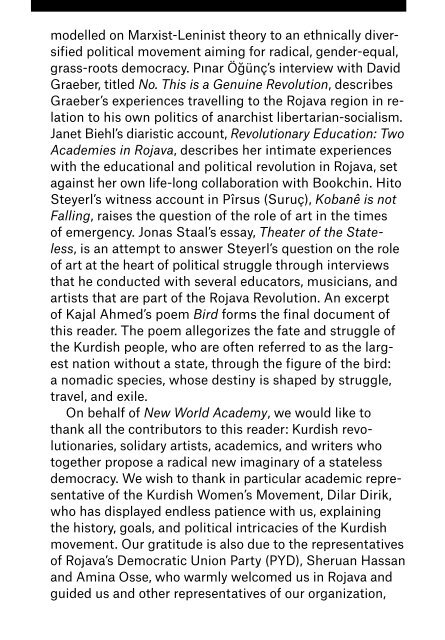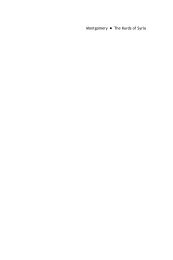Stateless Democracy
1RHiH4Y
1RHiH4Y
Create successful ePaper yourself
Turn your PDF publications into a flip-book with our unique Google optimized e-Paper software.
modelled on Marxist-Leninist theory to an ethnically diversified<br />
political movement aiming for radical, gender-equal,<br />
grass-roots democracy. Pınar Öğünç’s interview with David<br />
Graeber, titled No. This is a Genuine Revolution, describes<br />
Graeber’s experiences travelling to the Rojava region in relation<br />
to his own politics of anarchist libertarian-socialism.<br />
Janet Biehl’s diaristic account, Revolutionary Education: Two<br />
Academies in Rojava, describes her intimate experiences<br />
with the educational and political revolution in Rojava, set<br />
against her own life-long collaboration with Bookchin. Hito<br />
Steyerl’s witness account in Pîrsus (Suruç), Kobanê is not<br />
Falling, raises the question of the role of art in the times<br />
of emergency. Jonas Staal’s essay, Theater of the <strong>Stateless</strong>,<br />
is an attempt to answer Steyerl’s question on the role<br />
of art at the heart of political struggle through interviews<br />
that he conducted with several educators, musicians, and<br />
artists that are part of the Rojava Revolution. An excerpt<br />
of Kajal Ahmed’s poem Bird forms the final document of<br />
this reader. The poem allegorizes the fate and struggle of<br />
the Kurdish people, who are often referred to as the largest<br />
nation without a state, through the figure of the bird:<br />
a nomadic species, whose destiny is shaped by struggle,<br />
travel, and exile.<br />
On behalf of New World Academy, we would like to<br />
thank all the contributors to this reader: Kurdish revolutionaries,<br />
solidary artists, academics, and writers who<br />
together propose a radical new imaginary of a stateless<br />
democracy. We wish to thank in particular academic representative<br />
of the Kurdish Women’s Movement, Dilar Dirik,<br />
who has displayed endless patience with us, explaining<br />
the history, goals, and political intricacies of the Kurdish<br />
movement. Our gratitude is also due to the representatives<br />
of Rojava’s Democratic Union Party (PYD), Sheruan Hassan<br />
and Amina Osse, who warmly welcomed us in Rojava and<br />
guided us and other representatives of our organization,<br />
the New World Summit, through the region, aiding us with<br />
endless translations so that we could understand the dayto-day<br />
political and cultural struggle of the Rojava Revolution.<br />
Their hospitality and care was exceptional, especially<br />
in times such as these, when the communities of Rojava<br />
are living through such severe crises. We further thank the<br />
International Free Women’s Foundation, the Kurdish Federation<br />
in The Netherlands, and the web platform Kurdish<br />
Question for all of their support in developing this reader.<br />
Last but certainly not least, we want to thank Maria<br />
Hlavajova and her team at BAK — in particular Arjan van<br />
Meeuwen, Niek van der Meer, Şeyma Bayram, and Marieke<br />
Kuik — for their ongoing commitment to New World Academy,<br />
as well as the Centraal Museum and its director Edwin<br />
Jacobs for having contributed to making this publication<br />
on the Kurdish Women’s Movement financially possible.<br />
As we are an academy that strives towards progressive<br />
artistic and cultural practices, making art in the world as<br />
it exists is not enough: our challenge is to make a world.<br />
But that does not happen in isolation. In order to make<br />
this possible, we need coalitions with progressive political<br />
movements, but also with progressive art institutions. New<br />
World Academy is privileged to have worked with such<br />
partners, collaborators, and friends.<br />
At the very beginning of our collaboration, Maria Hlavajova<br />
asked: “What if democracy was not a show?” Having<br />
arrived at this fifth reader with the Kurdish Women’s Movement,<br />
titled <strong>Stateless</strong> <strong>Democracy</strong>, we feel that we can finally<br />
answer this question. If democracy is not a show, it means<br />
that we have to take its practice beyond the limitations of<br />
the capitalist nation-state. <strong>Stateless</strong> democracy proposes<br />
a concrete aesthetic and ethical engagement that does not<br />
await the promise of a better future, but claims autonomy<br />
through practice in the here and now. It does not outsource<br />
its demand to a future that might never come, but dedi-<br />
22–23



